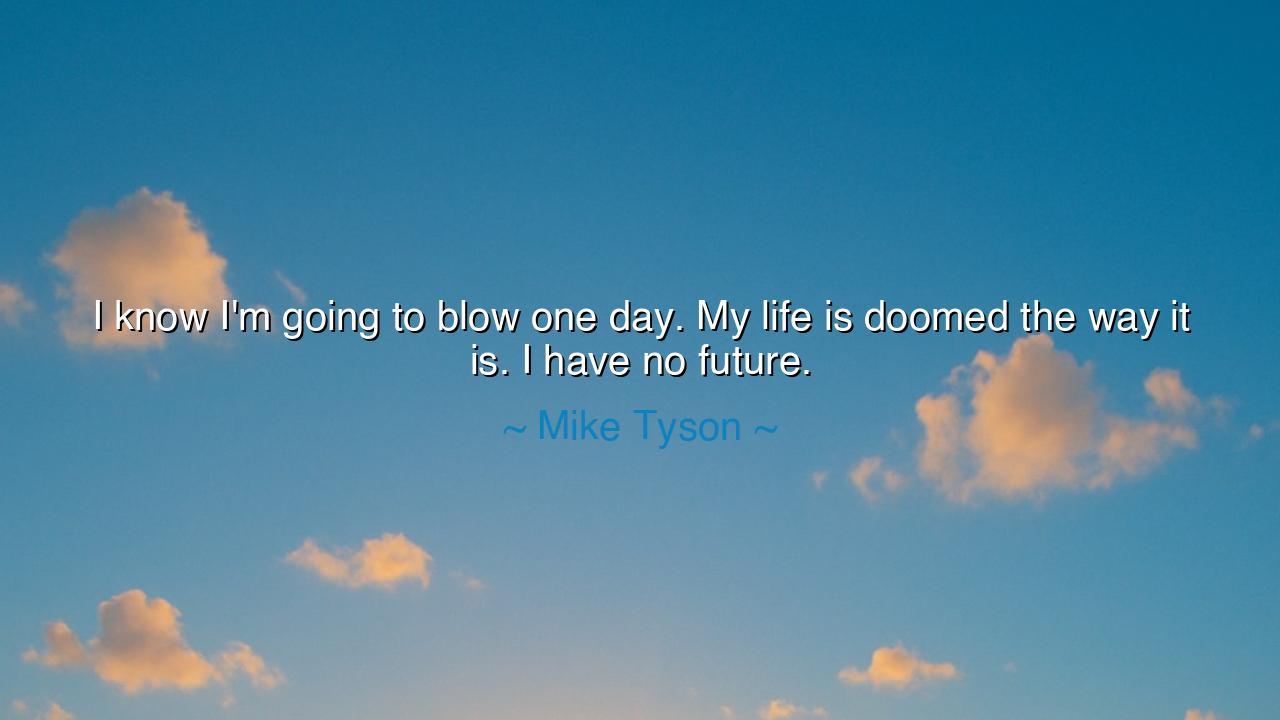
I know I'm going to blow one day. My life is doomed the way it






In the words of Mike Tyson, we are confronted with a raw and unsettling reflection on fate, self-doubt, and the fragility of the human spirit. Tyson's admission that he believes his life is doomed, and that he has no future, speaks to the deeply human experience of feeling trapped in circumstances beyond one's control. His words encapsulate the fear and resignation that can take hold when one feels that success, happiness, or even survival is beyond reach. Tyson’s statement is a moment of vulnerability, where he lays bare the internal struggle that many individuals face in moments of despair, when the future feels like an insurmountable challenge.
This sense of fate and self-doubt is not a new phenomenon. The ancients, too, grappled with the concept of fate and the overwhelming forces that seem to shape human life. In Greek mythology, the Moirae, or Fates, were believed to control the thread of life for every individual, determining when they were born, how they would live, and when they would die. These deities embodied the ancient belief that destiny was something that could not be avoided, no matter how hard one fought against it. Much like Tyson’s declaration of inevitability, the Greeks saw human beings as subject to the whims of forces greater than themselves. But even within this belief, there was always an underlying desire to defy fate, to prove that through willpower and action, one might break free from the constraints of destiny.
Consider the story of Oedipus, the tragic hero of Sophocles' play. Oedipus was foretold by the oracle to kill his father and marry his mother—a prophecy he desperately tried to avoid. Despite all his efforts to alter the course of his life, the prophecy came to pass. The ancient Greeks understood that even the greatest attempts at self-determination could be thwarted by fate. Oedipus' story, much like Tyson’s sentiment, is one of despair and the feeling that no matter what steps one takes, the future is beyond one’s control. But even in the tragedy of Oedipus, there lies a lesson: that self-awareness, however painful, is an essential part of the human experience. Tyson’s acknowledgment of his struggles is his own moment of self-reflection, and it’s through facing this darkness that growth and change may begin.
Similarly, in Roman culture, figures like Cicero often wrestled with the concept of fate and self-mastery. Cicero believed in the power of virtue and the ability of individuals to shape their own destinies through reason and moral character. However, he also recognized that the external world often shaped an individual’s path in unpredictable ways. The Stoics, including Seneca and Epictetus, embraced the idea that while we cannot control the external forces that affect us, we do have the power to control our response. Their teachings focused on accepting fate’s blows with dignity, while continuing the struggle toward virtue. Tyson’s feelings of doom can be seen as a moment of Stoic reflection, recognizing that while one may not have control over everything, one still has the ability to choose how to respond to the inevitable challenges of life.
King Solomon of the Hebrew Bible also contemplated the transient and often unpredictable nature of human life. In the Book of Ecclesiastes, Solomon famously wrote, “Vanity of vanities, all is vanity,” expressing a deep sense of the futility of human endeavor in the face of death and fate. Solomon’s reflections mirror Tyson’s sense of being doomed, as he grapples with the ephemeral nature of success and happiness. Yet, Solomon’s words are not entirely despairing; they offer a lesson on the importance of acceptance and wisdom in facing life’s uncertainty. Just as Tyson expresses his internal struggles, Solomon’s writing suggests that we must find meaning and peace not by controlling the future, but by accepting the present with grace and humility.
The lesson in Tyson’s words is one of self-awareness and the human condition. His acknowledgment of his fate—his belief that he is doomed—speaks to the deep fear and vulnerability that many of us experience when we feel overwhelmed by the challenges we face. Yet, it also serves as an invitation to reflect on how we view our own future. Are we, like Oedipus, destined to fall into our fears, or can we, like Cicero and the Stoics, find strength and resilience in the face of adversity? The ancient wisdom suggests that while we may not control everything, we do have the ability to choose our response, to embrace what is within our power, and to learn from the struggle.
In practical terms, this means that we must embrace the uncertainty of life and not shy away from the challenges that lie before us. Tyson’s words are a reminder that even in our darkest moments, we have the choice to rise, to learn, and to continue moving forward. Rather than succumbing to the belief that we are doomed, we can choose to act in ways that reshape our path, to accept the hardships we face while striving for growth. Life may be full of fate’s trials, but through self-awareness, reflection, and action, we can carve out a future defined not by doom, but by our response to the challenges before us.






AAdministratorAdministrator
Welcome, honored guests. Please leave a comment, we will respond soon